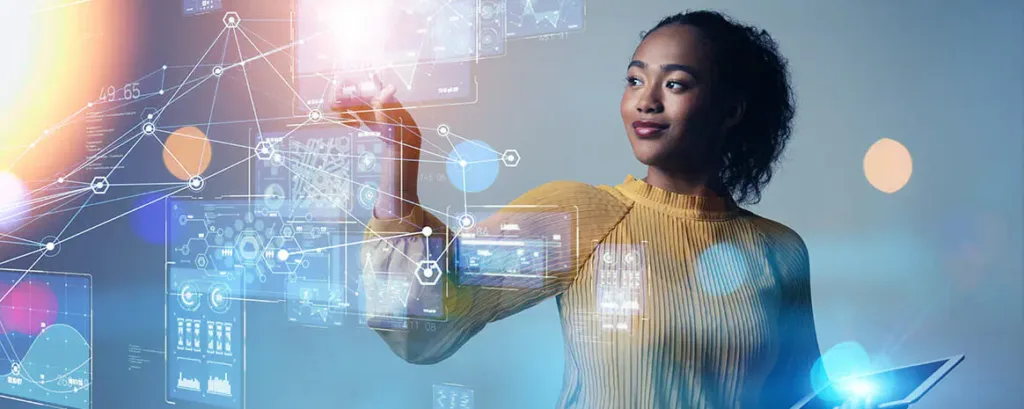It’s essential to approach AI with a critical eye, recognizing its potential to both challenge and reinforce societal biases. “As we integrate AI into the workplace, continuous efforts must be made to make sure these technologies are designed and implemented in a way that promotes equity. This includes diverse teams in AI development, transparent AI models, and ongoing assessment of AI’s impact on workplace equality,” says BetterAI Co-Founder, CEO and highly credentialed data scientist Angel Vossough.
 She believes that, through thoughtful application of AI, we have a unique opportunity to shape a more inclusive future for all. Here are Angel’s perspectives on the career opportunities, and obstacles, related to this emerging technology along with insights for female data scientists in general.
She believes that, through thoughtful application of AI, we have a unique opportunity to shape a more inclusive future for all. Here are Angel’s perspectives on the career opportunities, and obstacles, related to this emerging technology along with insights for female data scientists in general.
How do you feel AI can play a role in advancing gender equality in the workplace?
AI has the potential to significantly advance gender equality in the workplace by offering unbiased data analysis and decision-making processes. For platforms like DiverseUp, AI can analyze vast amounts of data regarding corporate policies, culture, and practices to identify biases and recommend improvements. More than 50 percent of women in tech leave their positions mid-career, making retention of female talent one of the big challenges for tech companies. AI can assist in developing more equitable hiring practices, identifying gender pay gaps, and suggesting corrective actions. AI can also help in creating personalized career development plans for women, taking into account their unique circumstances and preferences, thereby promoting a more inclusive workplace environment and increasing retention.
How can women use AI in their career search to help make wise selections?
Women can leverage AI in their career search by using AI-powered job recommendation engines that align with their career goals, personal values, and work-life balance needs. AI can analyze their profiles, skills, and preferences against job listings to recommend the best fits. Additionally, AI can provide insights into company cultures and practices, helping women choose employers based on their personal preferences, such as flexible working hours, maternity leave, and career development programs. AI can empower women to make informed decisions when it comes to career choices.
What are some of the ways women could be leveraging AI for personal/career development and growth?
AI can offer personalized learning and development recommendations, identify skill gaps, and help with upskilling or reskilling in their chosen field. It can suggest courses, workshops, or assignments to bridge these gaps. It can also help with networking by connecting women with mentors, peers, and professional communities that can support their career advancement, using matching algorithms to find the best mentor-mentee relationships.
How can organizations use AI to help ensure their recruiting practices are equitable?
AI-driven analytics can help organizations identify patterns in hiring and turnover, and predict shortcomings in their recruitment processes, enabling them to make data-driven adjustments. Organizations can employ AI to design job descriptions that are neutral and appealing to all genders, analyze resume data without bias, and standardize interviews. However, post-recruitment retention of female employees is as important as recruitment, and is a challenge for tech companies. For example, unlike men, women display a pattern called “returnship,” where they leave their careers to focus on family life and return to the workforce a few years later. These qualified candidates are often overlooked by recruiters because of this gap in work history. By training AI on this known pattern, AI can identify and target these potential employees for recruitment and retraining.

What do you think the next five years holds in terms of the increasing impact AI and other technologies will have on women in the workplace?
In the next five years, the impact of AI and technology on women in the workplace is likely to increase significantly. We can expect more sophisticated AI tools for career development, networking, and mentorship, specifically designed with women’s needs in mind. AI will also play an important role in eliminating biases from recruiting processes, which can help more women enter tech roles. Furthermore, as remote and flexible working becomes more prevalent, AI will help women balance their professional and personal lives more effectively.
What in your background spurred your interest in developing technology solutions?
My background is in applied math and software engineering. I was always fascinated by statistics and analyzing big data. I worked at Cisco for more than 10 years as a network engineer and was dealing with lots of data to monitor network performance and detect anomalies and patterns. As the only woman on my team, I was in charge of recruiting technical women in my department. Through this, I learned so much about the choices women make in directing their careers and understood the depth of the challenges. I was very fortunate that Cisco was a leader in having enlightened policies on flexible work, and they let me work remotely while raising my twin daughters for the first year. Meanwhile, I was seeing my high-achieving female friends, intelligent and highly qualified, “dropping out” after starting families.
Many of my female friends gave up on their careers due to a lack of support from their employers to effectively integrate their lives and careers. Every year, Forbes publishes “America’s Best Employers for Women.” I was always wondering what this really meant. Our lives as women are dynamic, and depending on where we are in our lives and what stage we are going through, we have different needs. Usually, in our 20s, we want to advance our careers and climb up the corporate ladder, while in our 30s, we might need job flexibility and longer maternity leave. As a result, we need different decision-making criteria for different life situations.
This realization led me to my next journey of my life in building my own startup, called “DiverseUp,” to help women find a better way when choosing an employer. DiverseUp was created as a benefit- corporation to serve professional women seeking to expand their careers and achieve a sustainable work-life balance. DiverseUp provided women with an inside look into which companies had female-friendly policies and cultures and matched them with job opportunities at those companies. The goal was to bring transparency to work practices, measure diversity policy effectiveness, and help companies attract and retain female talent.
During COVID-19, I decided to go back to school to get my 2nd Master degree in Data Science at UC Berkeley. That was a great experience and helped me learn the latest in the field and how to apply it practically. My master’s thesis was focused on search and recommendations using AI, and that became my current startup, BetterAI. One of our first products is a virtual sommelier, called VinoVoss (vinovoss.com).
What challenges have you faced along your career journey?
One of the most significant challenges was navigating the tech industry as one of the only women in technical teams, especially in leadership roles. This experience highlighted the importance of diversity and inclusion in tech, driving me to understand and address the high turnover rates of women in tech. My focus on attracting and retaining female talent in such a dynamic and sometimes challenging environment tested my resilience but ultimately strengthened my leadership and advocacy for women in tech.
The role of women in data is not just about filling seats but about bringing diverse perspectives that can lead to innovative solutions and approaches. As the data science field continues to evolve, it’s imperative that industry creates environments that support the growth and retention of women. This includes addressing gender-specific challenges, providing mentorship, and making sure there are equal opportunities for advancement.
What career advice do you have for other female with aspirations in the technology industry?
My advice is to pursue your curiosity. Dive deep into using the tools available today, and imagine how they can and should be better. Seek out mentors and networks that support your growth, and don’t shy away from taking on challenging projects that stretch your capabilities. The AI field thrives on diversity of thought and innovation, so your contributions can truly make a difference.
Is there anyone in particular who’s inspired you?
While I’ve had the privilege of working with many inspiring figures throughout my career, Jennifer Doudna is one of my favorite role models. Her groundbreaking work in CRISPR-Cas9 gene editing technology not only revolutionized the field of genetics but also exemplified the profound impact that women can have in STEM. Doudna’s dedication to ethical considerations in science, her collaborative approach to research, and her commitment to mentorship, especially for women in science. Her achievements in a traditionally male-dominant field have shown me the importance of perseverance, innovation, and the pursuit of knowledge.
As a woman, do you have – or aspire to have – work-life balance?
Balancing home and professional life is an ongoing journey that requires flexibility, prioritization, and support. I believe in setting clear boundaries, focusing on efficiency, and being present in whatever task or role I am engaging in at the moment. Communication with my family about my professional commitments and responsibilities helps maintain this balance. Additionally, delegating tasks and trusting in the support systems both at work and home, including my network of family and friends, is important.
What do you do outside of work?
Outside of my professional interests, I love cooking and learning about new cuisines. I like trying new things. I enjoy experimenting with diverse cuisines and ingredients, which mirrors my approach to data science—mixing different elements to create something new and interesting. This hobby not only serves as a creative outlet but also allows me to connect with cultures and stories from around the world.
https://www.dataversity.net/?s=betterai
About Angel Vossough
Vossough is CEO and Co-Founder of Silicon Valley-based BetterAI, develops innovative AI solutions for her own company, including “BetterMed” and “VinoVoss,” and the businesses of others. Vossough’s company uniquely leverages advanced AI tech like Machine Learning, Generative AI, Natural Language Processing and Computer Vision to create transformative vertical industry solutions. A serial entrepreneur with a deep tech background, Angel holds dual Bachelors’ in Mathematics and Computer Engineering and a Master’s with honors in Software Engineering and Data Science from UC Berkeley. Angel’s diverse experience includes roles at Cisco Systems, DiverseUp and Caspian Capital.
About BetterAI
BetterAI is a Silicon Valley-based Artificial Intelligence (AI) startup company that provides a variety of AI services and products. With a team of experienced AI Researchers, Data Scientists, Machine Learning, and Software engineers, BetterAI provide cutting-edge AI solutions to help businesses drive innovation and efficiency. They also offer custom AI solutions for companies with specific needs. BetterAI’s mission is to enable companies to unlock the power of AI and harness it to create competitive advantages and growth. Their products are designed to automate processes, improve customer engagement, and provide actionable insights. The company’s AI-powered “VinoVoss” semantic search and recommendation system, driven by a group of researchers, analysts, engineers, software developers, certified wine experts and sommeliers, is leveraging leading edge technologies like AI, Machine Learning, Generative AI, Natural Language Processing and Computer Vision to provide consumers with a transformative solution that is revolutionizing the relationship between wine and digital platforms. Learn more at www.BetterAI.io and www.VinoVoss.com.

